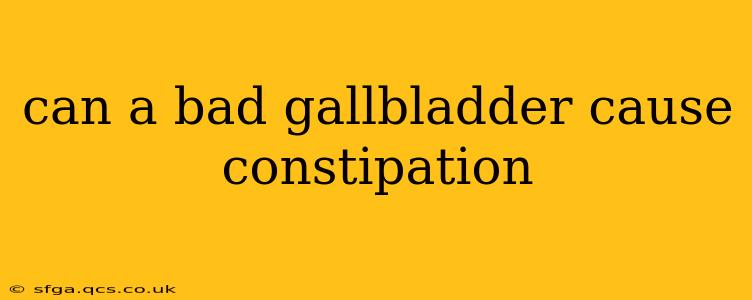Gallbladder problems are often associated with digestive distress, but can a bad gallbladder actually cause constipation? The answer isn't a simple yes or no, as the relationship is complex and indirect. While a gallbladder issue itself doesn't directly obstruct the bowels, it can trigger symptoms that contribute to constipation. Let's explore the connection.
How Does the Gallbladder Work, and How Can Problems Arise?
Before understanding the link to constipation, let's review gallbladder function. The gallbladder is a small, pear-shaped organ located under the liver. Its primary role is to store and concentrate bile, a fluid produced by the liver crucial for fat digestion. When we eat fatty foods, the gallbladder contracts, releasing bile into the small intestine to help break down fats.
Problems arise when the gallbladder isn't functioning optimally. Gallstones, inflammation (cholecystitis), or other gallbladder disorders can disrupt the bile flow. This disruption can lead to a cascade of digestive issues, some of which can indirectly affect bowel movements.
Can Gallbladder Problems Lead to Constipation?
While not a direct cause, gallbladder problems can contribute to constipation in several ways:
-
Changes in Diet: People experiencing gallbladder pain often restrict their diet, avoiding fatty foods to minimize discomfort. This dietary change can lead to reduced stool frequency and harder stools, contributing to constipation. A lack of sufficient dietary fiber, often unintentionally adopted due to gallbladder issues, further exacerbates this problem.
-
Pain and Reduced Physical Activity: Gallbladder attacks can be incredibly painful, limiting mobility and physical activity. Reduced movement can slow down bowel transit time, leading to constipation.
-
Medication Side Effects: Some medications prescribed for gallbladder problems, such as pain relievers, can cause constipation as a side effect.
What are the Symptoms of Gallbladder Problems?
It's crucial to distinguish gallbladder issues from other causes of constipation. Common symptoms of gallbladder problems include:
- Severe pain in the upper right abdomen: This pain may radiate to the right shoulder or back.
- Nausea and vomiting: Often associated with fatty meals.
- Indigestion and bloating: Feeling full or uncomfortable after eating.
- Fever and chills: Indicative of infection.
- Jaundice: Yellowing of the skin and eyes (less common but serious).
What if I Experience Both Gallbladder Problems and Constipation?
If you experience both gallbladder issues and persistent constipation, it's essential to seek medical attention. Your doctor can perform diagnostic tests to determine the underlying cause of both symptoms and recommend appropriate treatment. Self-treating can be dangerous, and accurately identifying the root cause is vital for effective management.
How is Gallbladder Disease Diagnosed?
Diagnosis often involves a combination of:
- Physical examination: To assess your symptoms and physical signs.
- Blood tests: To check for inflammation and other abnormalities.
- Imaging tests: Such as ultrasound, CT scan, or HIDA scan to visualize the gallbladder and detect gallstones or other abnormalities.
What are the Treatment Options for Gallbladder Problems?
Treatment depends on the specific problem and its severity. Options may include:
- Dietary changes: Modifying the diet to reduce symptoms.
- Medication: To manage pain and inflammation.
- Surgery: Cholecystectomy (gallbladder removal) is often recommended for gallstones or severe cholecystitis.
In conclusion, while a bad gallbladder doesn't directly cause constipation, it can significantly influence bowel habits through dietary restrictions, pain-related inactivity, and medication side effects. If you suspect gallbladder problems or experience persistent constipation, consulting a healthcare professional is crucial for proper diagnosis and management. Don't hesitate to seek medical advice if you have concerns about your digestive health.
